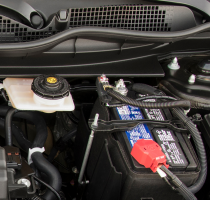— Battery drain has caused a Honda class action lawsuit that alleges 2017-2019 Honda CR-V and 2016-2019 Honda Accord vehicles shut down from battery problems.
The class action lawsuit says parasitic battery drain causes multiple failures of safety functions, including the headlights and emergency hazard lights an owner needs if the vehicle stalls.
The Honda class action lawsuit also alleges multiple incidents of a drained battery causes the alternator to work too hard and fail.
Honda Accord and CR-V Battery Problems
The lawsuit alleges Honda first mentioned the battery problems in February 2017 when it filed an “Engineering Request for Investigation” with the government. Honda said it was "investigating certain 2016-2017 Accord V6s with a customer complaint of a no-start condition that requires the 12V battery to be replaced.”
Honda also issued more dealer messages in 2017 regarding “customer complaint[s] of a no-start condition that requires the 12V battery to be replaced” in 2016-2017 Accords.
Additionally, a “Tech Line Summary Article” said the automaker conducted an “investigation” into 2017 CR-Vs being brought in for weak or dead batteries, yet the vehicles and batteries “check out ok.”
Honda “found that a software bug in the VSA [Vehicle Stability Assist] system may be keeping it awake when the ignition is turned to OFF. This can cause a 350 mA parasitic draw that may result in a weak or dead battery.”
Honda “found that this issue appears to happen only when a certain shut down procedure is done, and it’s rare when it does.” Honda allegedly didn't have a fix but warned, “this parasitic draw can be avoided by setting the electric parking brake before turning the ignition to OFF.”
Honda also issued technical service bulletin 17-03265 which warned dealerships 2017 CR-Vs “may have an intermittent 350mA current draw after the vehicle is shut off[,]” in which case “[t]he vehicle does not start due to a low battery.”
“The VSA software logic may not allow the VSA modulator-control unit to shut down correctly and go into sleep mode after the vehicle is shut off. This can happen if the electronic parking brake (EPB) is applied within 3 to 4 seconds of the vehicle being shut off or if the EPB switch is held for a 3 to 4 second duration when the vehicle is off.” - TSB 17-03265
Honda was to “[u]pdate the VSA modulator-control unit, do the VSA sensor neutral position memorization (ALL SENSOR), set the tire pressures to the driver’s door jamb label cold inflation values, and do the TPMS calibration procedure."
In 2018, Honda announced it had launched a battery collection program for 2017-2018 CR-Vs. Then in March 2019 Honda issued TSB 19-039, warning 2019 CR-Vs may “fail[] to start after being parked for an extended period.”
“After the vehicle is parked for an extended period, the PCM begins an evaporative system leak check after meeting certain criteria. Under certain conditions, it may not return to sleep mode, causing the battery to discharge.” — TSB 19-039
The Honda class action lawsuit argues multiple additional actions occurred due to battery problems, including product updates and a CR-V owner notification program.
“After the vehicle is parked for an extended period, the powertrain control module (PCM) begins an evaporative system leak check after meeting certain criteria. Under certain conditions, the PCM will not return to sleep mode, and may ultimately result in a dead battery. This is not an indication of a leak in the evaporative system.”
Continued battery drain problems caused updates to service bulletins, messages to dealerships, battery collection programs and additional TSBs.
The Honda class action lawsuit references multiple complaints about Accord and CR-V drained batteries, including complaints filed with CarComplaints.com.
In one case, the owner of a 2019 CR-V complained her vehicle “stall[ed] out” at least three times in a matter of weeks. Her SUV first stalled when she was driving 10-15 mph in her work parking lot. Three weeks later as she was driving 60 mph on a highway, the CR-V “completely died with no warning lights or indication.”
The Honda owner said the vehicle lost power steering and the engine couldn't be restarted. Then a week later and after dropping off her SUV at the Honda dealership, the CR-V “completely stalled out again” while driving, “leaving [her] in danger of” getting hit by other vehicles.
The Honda class action lawsuit over battery problems was filed in the U.S. District Court for the Southern District of Iowa: George Jones, v. American Honda Motor, Co., Inc.
The plaintiff is represented by Shindler, Anderson, Goplerud & Weese PC, and Fegan Scott LLC.

